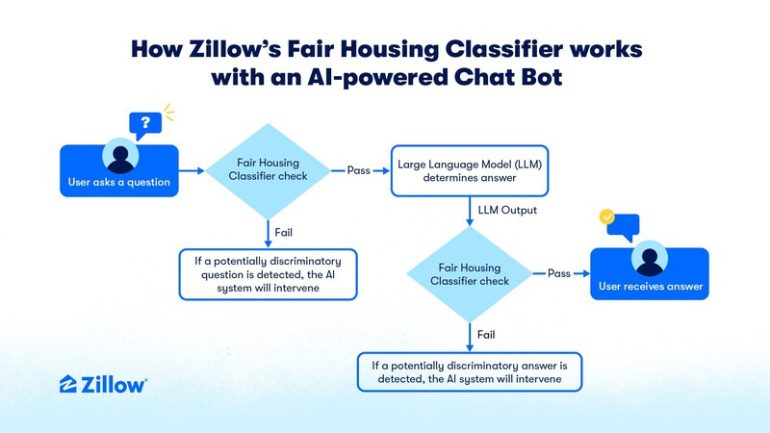- Zillow introduces its Fair Housing Classifier, an open-source tool for unbiased real estate interactions.
- The Classifier aims to mitigate the risk of illegal steering based on protected characteristics.
- It promotes equitable conversations with AI technology by detecting and addressing discriminatory responses.
- Accessible on GitHub, the Classifier invites collaboration for refinement and enhancement.
- Despite fair housing laws in place for decades, discrimination persists, highlighting the need for continued education and tools like the Classifier.
Main AI News:
In a move towards fostering equitable real estate interactions, Zillow has unveiled its open-source Fair Housing Classifier. This innovative tool sets standards to ensure responsible and unbiased conduct within real estate conversations powered by large language model (LLM) technology.
AI tools often overlook fair housing requirements, potentially perpetuating bias and hindering progress in advocating for fair housing. Zillow’s Fair Housing Classifier addresses this issue by focusing on mitigating the risk of illegal steering — the practice of influencing a buyer’s choice of communities based on legally protected characteristics.
“Zillow has been utilizing AI since 2006 to provide transparency to home shoppers, powering tools such as the Zestimate,” noted Josh Weisberg, Senior Vice President of Artificial Intelligence at Zillow. “Our commitment to enhancing transparency in real estate is evident through the release of this classifier as open-source. We firmly believe that technological advancements should not compromise equity and fairness for consumers. By offering free access, we aim to encourage collaboration and improvement from civil rights, tech, and real estate sectors.”
The Fair Housing Classifier serves as a safeguard, promoting more equitable interactions with AI technology. It identifies questions that may elicit discriminatory responses regarding legally protected groups in real estate interactions, such as those facilitated by search or chatbots. Notably, it detects instances of noncompliance in both input and output, empowering system developers to intervene as necessary.
“In today’s rapidly evolving AI landscape, ensuring safe, secure, and trustworthy AI practices in housing and lending is paramount to safeguarding consumers against algorithmic harms,” remarked Michael Akinwumi, Ph.D., Chief Responsible AI Officer at the National Fair Housing Alliance. “Zillow’s open-source initiative sets a commendable example for responsible innovation. We urge other organizations and coalition groups to actively engage, test, and enhance the model, sharing their insights with the public.”
Zillow’s decision to offer the Fair Housing Classifier as open-source underscores its dedication to transparency, equity, and fair housing in the real estate sector. Organizations interested in adopting the Classifier can access the code and comprehensive framework on GitHub. Trusted partners seeking to contribute to and enhance the Classifier can request access to training data and a pretrained model by contacting the provided email alias on the GitHub page, presenting a genuine use case. This transparent approach encourages contributions to refine the model, with improvements accepted through the standard request process on GitHub.
With millions of Americans seeking housing online, it’s imperative to equip them with tools for fair and transparent home-seeking experiences. A recent Zillow survey across 26 major U.S. metropolitan areas revealed that younger generations, renters, LGBTQ+ individuals, and people of color consider fair housing a significant concern. Despite fair housing laws being in place for nearly six decades, discrimination remains prevalent, as highlighted in Zillow’s Housing Aspirations Report. The report found that 57% of respondents reported experiencing some form of housing discrimination, with certain groups, like LGBTQ+ populations, facing higher rates. However, only 42% of respondents acknowledged the impact of fair housing on themselves or their families, indicating the need for continued education about fair housing rights.
The release of the Fair Housing Classifier as open-source is just one facet of Zillow’s commitment to a consumer-centric approach. Earlier this year, Zillow’s cross-functional ethical AI team published AI principles, emphasizing the company’s dedication to equitable outcomes in real estate.
Conclusion:
Zillow’s release of the Fair Housing Classifier signals a commitment to transparency and equity in the real estate market. By providing an open-source solution to address discriminatory practices, Zillow sets a precedent for responsible innovation. This move emphasizes the importance of leveraging technology to promote fairness and inclusivity in housing, ultimately shaping a more equitable market landscape.

